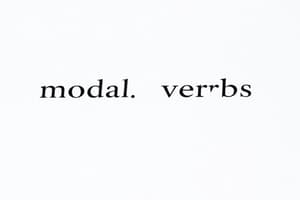Podcast
Questions and Answers
In which context is 'may' typically preferred over 'might' when discussing possibility?
In which context is 'may' typically preferred over 'might' when discussing possibility?
- Expressing a sense of strong certainty
- When expressing something unexpected
- Academic or formal discussions regarding characteristics or behavior (correct)
- Informal conversations about future plans
It is appropriate to use 'may' in questions to inquire about the possibility of something happening.
It is appropriate to use 'may' in questions to inquire about the possibility of something happening.
False (B)
Fill in the blank with one word: When offering help in a formal way, we ask '_____ I help you?'
Fill in the blank with one word: When offering help in a formal way, we ask '_____ I help you?'
May
To emphasize that something is unexpected, one can use the phrase 'may _____'.
To emphasize that something is unexpected, one can use the phrase 'may _____'.
Which of the following best describes the use of 'might + bare infinitive'?
Which of the following best describes the use of 'might + bare infinitive'?
'May' is preferentially used over 'might' to speak about what you will possibly do in the future.
'May' is preferentially used over 'might' to speak about what you will possibly do in the future.
Match the modal verb construction with its usage:
Match the modal verb construction with its usage:
When describing that someone or something compensates for a weakness, we can use the construction 'may/might not + bare infinitive... _____...'.
When describing that someone or something compensates for a weakness, we can use the construction 'may/might not + bare infinitive... _____...'.
Which modal verb can be used interchangeably with 'may' or 'might' in sentences about possible events in the past, present, and future?
Which modal verb can be used interchangeably with 'may' or 'might' in sentences about possible events in the past, present, and future?
The phrases 'may have + past participle' and 'may be + -ing' can only refer to past events.
The phrases 'may have + past participle' and 'may be + -ing' can only refer to past events.
What auxiliary verb follows 'may' in 'may have been + -ing'?
What auxiliary verb follows 'may' in 'may have been + -ing'?
Which of the following alternatives is most appropriate for the sentence 'May you be in Spain this summer?'
Which of the following alternatives is most appropriate for the sentence 'May you be in Spain this summer?'
The sentence, 'During the war, the police may arrest you for criticizing the government,' implies that it was the police's legal right to arrest someone for criticism.
The sentence, 'During the war, the police may arrest you for criticizing the government,' implies that it was the police's legal right to arrest someone for criticism.
Fill in the blank with one word: 'She _____ not have danced very gracefully, but she had a lot of energy and enthusiasm.'
Fill in the blank with one word: 'She _____ not have danced very gracefully, but she had a lot of energy and enthusiasm.'
Which of the following sentences uses 'may' or 'might' to describe a possible activity over a period of time in the past?
Which of the following sentences uses 'may' or 'might' to describe a possible activity over a period of time in the past?
Complete the sentence using 'may' or 'might': 'His maths _____ have improved by the time the exam comes round'.
Complete the sentence using 'may' or 'might': 'His maths _____ have improved by the time the exam comes round'.
In the sentence, 'The painting may not be a masterpiece, but the colors are remarkable', the phrase 'may not be' expresses impossibility.
In the sentence, 'The painting may not be a masterpiece, but the colors are remarkable', the phrase 'may not be' expresses impossibility.
Which verb is used after 'might' to describe what was typically the case in the past?
Which verb is used after 'might' to describe what was typically the case in the past?
Which of the following phrases is used to ask for permission in a formal way?
Which of the following phrases is used to ask for permission in a formal way?
The use of 'may well' implies a sense of expectation.
The use of 'may well' implies a sense of expectation.
Which modal verb is likely being used incorrectly? 'May it be that you don't want to leave?' Can you replace it with a better option? _____ it be that you don't want to leave?
Which modal verb is likely being used incorrectly? 'May it be that you don't want to leave?' Can you replace it with a better option? _____ it be that you don't want to leave?
Which of the following sentences is grammatically incorrect?
Which of the following sentences is grammatically incorrect?
When talking about future plans, the context makes no difference when choosing weather to use 'may' or 'might'. For example, both work in formal and informal contexts.
When talking about future plans, the context makes no difference when choosing weather to use 'may' or 'might'. For example, both work in formal and informal contexts.
Fill in the blank with one word: 'Callum didn't know where the ball was, but he thought his sister _____ have been playing with it before she left for school.'
Fill in the blank with one word: 'Callum didn't know where the ball was, but he thought his sister _____ have been playing with it before she left for school.'
Which sentence is more appropriate to use in a formal context?
Which sentence is more appropriate to use in a formal context?
Flashcards
Use of 'may'
Use of 'may'
Expresses possibility, more common in academic or formal contexts.
Use of 'might'
Use of 'might'
Expresses possibility, often used in everyday speech for future actions.
May well / Might well
May well / Might well
Emphasizes something is unexpected.
Asking about possibility
Asking about possibility
Signup and view all the flashcards
Might + bare infinitive (past)
Might + bare infinitive (past)
Signup and view all the flashcards
May/might not...but...
May/might not...but...
Signup and view all the flashcards
May/might (not 'can') + have + past participle
May/might (not 'can') + have + past participle
Signup and view all the flashcards
May/might have been+ -ing
May/might have been+ -ing
Signup and view all the flashcards
Study Notes
- May and might have similar meanings when discussing possibility.
- May is favored in formal or academic contexts when discussing characteristics or behaviors stating, "The seeds from the plant may grow up to 20 centimeters in length."
- Might is preferred in spoken language to express what one might do in the future.
- May well or might well can emphasize an unexpected event
Asking About Possibilities
- May is not used to form questions about the possibility of something happening.
- Could or be likely is used for this purpose.
- Formal questions can use might.
- May can be used to ask for permission.
- May can be used to offer help in a formal way.
Might + Bare Infinitive
- Might + bare infinitive is sometimes used to describe typical past events (formal or literary).
- Could + bare infinitive can also refer to past ability.
Compensatory Characteristics
- May/might not + bare infinitive ... but ... indicates something compensates for a limitation.
- May/might not + have + past participle ... but ... is an alternative phrasing.
May/Might + have + Past Participle or be +-ing
- May/might (excluding can) + have + past participle can describe possible past, present and future events.
- May/might (excluding can) + be + -ing also describes these possible events.
- Could can replace may or might in these sentences.
- May/might + have been + -ing refers to possible situations or activities over a past period.
Exercise 17.1
- We may go to Majorca for our holiday this summer.
- The planet Venus might be seen clearly in the night sky this month.
- Might you see Yasemin this weekend?
- I feel really sore after playing tennis. I think I might have a bath.
- A: Someone's left their coat. B: It might be Nadia's?
- Exceeding the stated dose may cause drowsiness.
- It may well be the case that the evidence has been tampered with.
Exercise 17.2
- You should have come dancing. You might have enjoyed it.
- She might have been trying to get a book off the top shelf when she fell.
- Dr Carter might be coming over this evening, so can you tidy the house up a bit?
- As recently as the 1950s, employers might require a woman to leave her job when she got married.
- I've been offered a new job, so I may be moving to Dubai.
- Why not come and see us in March? The weather may have improved by then.
- During the riots of the 1960s, people might be imprisoned simply for being on the streets.
- He said he was in a lot of pain, but he may have been exaggerating.
- In the past, left-handed children might be punished for not holding a pen in their right hand.
- I may have told you this before. I can't remember.
Exercise 17.3
- He may not be the best singer in the world, but he tries hard.
- Hugh's old car might not be terribly comfortable, but at least it's reliable.
- Her English grammar may not be very accurate, but she is still very good.
- He may not work quickly but at least he's very reliable.
- but his opinions on music make you think.
- but she is really very fond of you.
- but the new museum of fishing is actually very good.
Studying That Suits You
Use AI to generate personalized quizzes and flashcards to suit your learning preferences.




